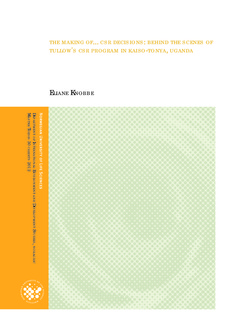The making of...CSR decisions : behind the scenes of Tullow's CSR Program in Kaiso-Tonya, Uganda
Master thesis
Permanent lenke
http://hdl.handle.net/11250/187820Utgivelsesdato
2012-08-07Metadata
Vis full innførselSamlinger
Sammendrag
Throughout the last decades, the yet-evolving concept of Corporate Social Responsibility (CSR) received a lot of attention from researchers, governments, civil society and businesses. Whereas the rationale for doing CSR is well-researched on, there is still a lack of information how CSR activities are being decided within companies from a structural perspective.
Hence, this study aimed at identifying the organizational decision-making processes before CSR activities. At the same time, the implementation of CSR activities and its perceived impact on the local communities of Kaiso Tonya area; Uganda, was targeted to be assessed. The selected case for this study was the oil and gas company Tullow Oil Uganda Ltd. and its CSR Program in the Kaiso-Tonya area.
The research design was a single case study with deductive reasoning. A descriptive decision theory approach was used as theoretical framework for the analysis of collected data. Primary, qualitative data from interviews as well as from the internet was collected and analyzed, using the method of process tracing.
Findings revealed that there was an identifiable organizational decision-making process behind Tullow’s CSR Kaiso-Tonya Program. This process can be divided into several stages and follows a certain organizational structure. Further, a number of influencing variables was revealed, such as regulations, stakeholders and other decision processes. The local communities and other stakeholders were found to be involved in decision process for the Kaiso-Tonya Program, if at all, as participants and consultants. Accordingly, it was observed that Tullow retained control over the design, and ultimately the CSR decisions itself. Moreover, the implementation scope of these decisions was found out to show a discrepancy between the claims of the company and the communities’ perception. According policy recommendations and ideas for future research were suggested.
